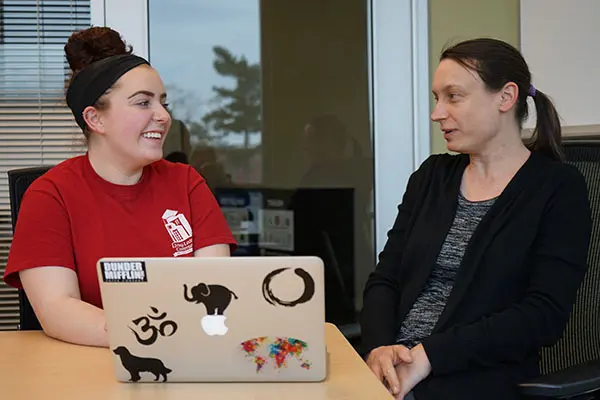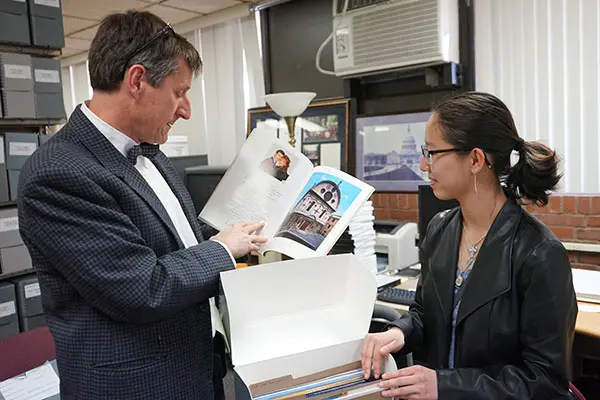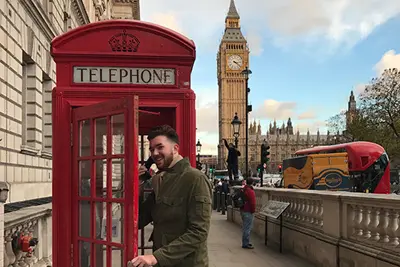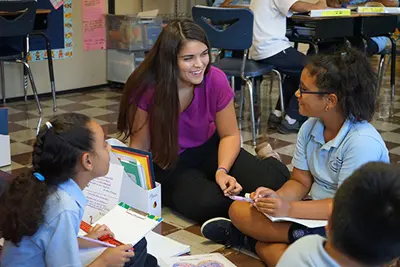$1,000 Grants Support Research, Reading, Service and Creative Ventures
 Image by K. Webster
Image by K. Webster
03/30/2018
By Katharine Webster
Honors student Abby Colangelo wants to become the kind of physical therapist who treats the whole person, so she’s majoring in exercise physiology and minoring in psychology.
She also has a personal interest in psychology: She suffers from anxiety.
So when Colangelo learned about an honors fellowship that would pay her to help Assoc. Prof. Ashleigh Hillier research the experiences of college students with depression, anxiety and other emotional and intellectual disabilities, she applied right away.
“I have a vested interest in anxiety, because I’m trying to figure out what works for me,” Colangelo says. “I’m also very interested in how exercise affects anxiety and depression. The fellowship has allowed me to explore more deeply and learn more about research to prepare for my honors thesis.”
Colangelo, who has helped Hillier with a literature review and focus groups of students, won one of 100 such fellowships offered to students in the Honors College this year.
The fellowships pay students in any major $1,000 for 100 hours of research, reading, service learning, creative work or an innovative project with a faculty, staff or community member. Students can complete them in a semester, spread them over an academic year or do them during the summer.
Some fellowships are advertised by faculty like Hillier who enjoy involving students in research, or sponsored by library staff who need help curating and cataloguing an archive. Honors students can also propose an independent project and find a faculty, staff or community member to advise them.
All recipients must present their results at the Student Research and Community Engagement Symposium or in another public forum.
The intent of most fellowships is to help students cultivate a mentor and prepare them for their honors thesis or project, says Honors College Dean Jim Canning.
“The student and faculty member often form a long-term academic relationship,” he says.
 Image by K. Webster
Image by K. Webster
For example, the R. Eugene Mellican fellowships pay six students, with preference given to science and engineering majors, to read six Plato dialogues and discuss them with a faculty member. Other students read all of Shakespeare’s comedies or Toni Morrison’s novels.
“I’m trying to find a way to incorporate more humanities into a student’s life and inspire a lifelong love of learning,” says Canning.
The reading fellowships grew out of Canning’s own experience. More than 25 years ago, he had just stepped down as Computer Science Department chairman when he decided that he was woefully undereducated in the humanities. He started listening to books on tape while commuting, a practice he’s kept up ever since. These days, he mentors many of the reading fellowships himself.
Chemistry major Amariah Condon applied for a broad, eclectic reading fellowship with Canning last year.
“I got the email about it while I was at Barnes and Noble, and it said you had to read ‘A Prayer for Owen Meany’ by John Irving. I went and got the book and read the first page, and I was in love,” Condon says.
At one of their weekly meetings, Condon told Canning she was majoring in chemistry to prepare for a career in art restoration. So he suggested another partnership: with History Department Chairman Christopher Carlsmith, who is writing a history of Save Venice Inc., a Boston-area nonprofit that works to preserve Venice’s artistic heritage.
Condon began working with Carlsmith in the fall – and she just won an honors fellowship to continue her research next year. She says the project is bridging her studies and her future career.
“This lets me interact with history and art and everything,” she says. “And it’s a nice change from all my science and math classes.”
The fellowship program began five years ago when Julie Nash, then associate dean of the College of Fine Arts, Humanities and Social Sciences and now vice provost for student success, offered Canning $3,500 toward research fellowships for honors students in her college. She asked him to match the amount.
Canning has expanded the fellowship program every year, thanks to generous donors and the provost’s office. Last year, he raised $50,000 – $15,000 more than he’d planned – after new Provost Michael Vayda offered him $50,000 and a challenge to create 100 fellowships this year.
Canning has already raised enough money from alumni, UMass Lowell faculty and staff, businesses and community nonprofits to offer another 100 fellowships next year. Applications are now open.




